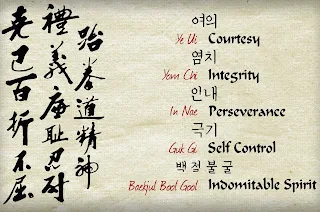The philosophy and principles of Taekwondo are deeply rooted in traditional Korean values, martial arts ethics, and philosophical teachings. These guiding principles shape the mindset, behavior, and approach of practitioners both on and off the training mat. Here are some key philosophical tenets and principles of Taekwondo:
1. Courtesy (Ye-ui): Courtesy is fundamental in Taekwondo and emphasizes respect, politeness, and consideration for others. Practitioners are taught to bow to instructors, fellow students, and opponents as a sign of respect. Courtesy extends beyond the dojang (training hall) and encompasses interactions in daily life.
2. Integrity (Yom-chi): Integrity is the quality of being honest, moral, and upright in both thought and action. Taekwondo practitioners are expected to demonstrate integrity by upholding moral principles, being truthful, and acting with sincerity and honor.
3. Perseverance (In-nae): Perseverance is the ability to persist and endure in the face of challenges, setbacks, and obstacles. Taekwondo teaches practitioners to develop mental toughness, resilience, and determination to overcome difficulties and achieve their goals.
4. Self-Control (Guk-gi): Self-control is the mastery of one's emotions, impulses, and behaviors. Taekwondo training emphasizes discipline and self-regulation, teaching practitioners to harness their physical and mental energy constructively and avoid acting impulsively or recklessly.
5. Indomitable Spirit (Baekjul Boolgool): Indomitable spirit refers to an unyielding resolve and unwavering determination in the pursuit of goals and ideals. Taekwondo instills in practitioners the courage, confidence, and inner strength to face challenges with resilience and courage, never giving up in the face of adversity.
6. Humility (Kyum-son): Humility is the quality of being humble and modest, acknowledging one's strengths and weaknesses without arrogance or pride. Taekwondo practitioners are encouraged to cultivate humility, recognizing that there is always more to learn and room for improvement.
7. Focus and Concentration (Jip-jung): Focus and concentration are essential for achieving excellence in Taekwondo. Practitioners learn to channel their attention and energy into the present moment, maintaining sharp focus and mental clarity during training, competitions, and everyday tasks.
8. Balance (Kyun Hyung): Balance encompasses physical, mental, and emotional equilibrium. Taekwondo training seeks to develop balance in all aspects of life, promoting harmony between mind, body, and spirit.
9. Community and Brotherhood (Woo-Dang): Taekwondo fosters a sense of community, camaraderie, and mutual support among practitioners. The dojang serves as a place for building friendships, teamwork, and solidarity, transcending differences of age, gender, race, or background.
10. Non-Violence (In-mook): While Taekwondo is a martial art that teaches self-defense techniques, its philosophy emphasizes the avoidance of conflict and the pursuit of peace. Practitioners are taught to use their skills responsibly and only as a last resort to protect themselves or others.
These principles of Taekwondo serve as guiding lights for practitioners, shaping their character, behavior, and outlook on life both inside and outside the training hall. Through adherence to these philosophical values, practitioners strive to become not only skilled martial artists but also virtuous individuals who contribute positively to their communities and society.
Arranged and Interpreted by:
GM MICHAEL KAVITA
President: Kenya Taekwondo Jidokwan Federation






No comments:
Post a Comment